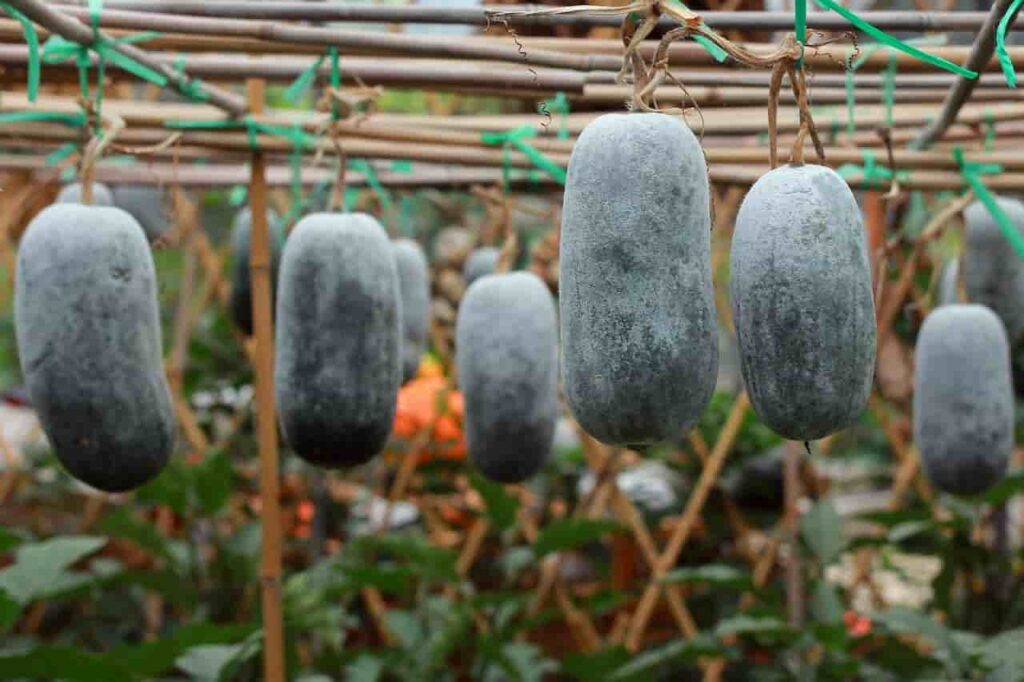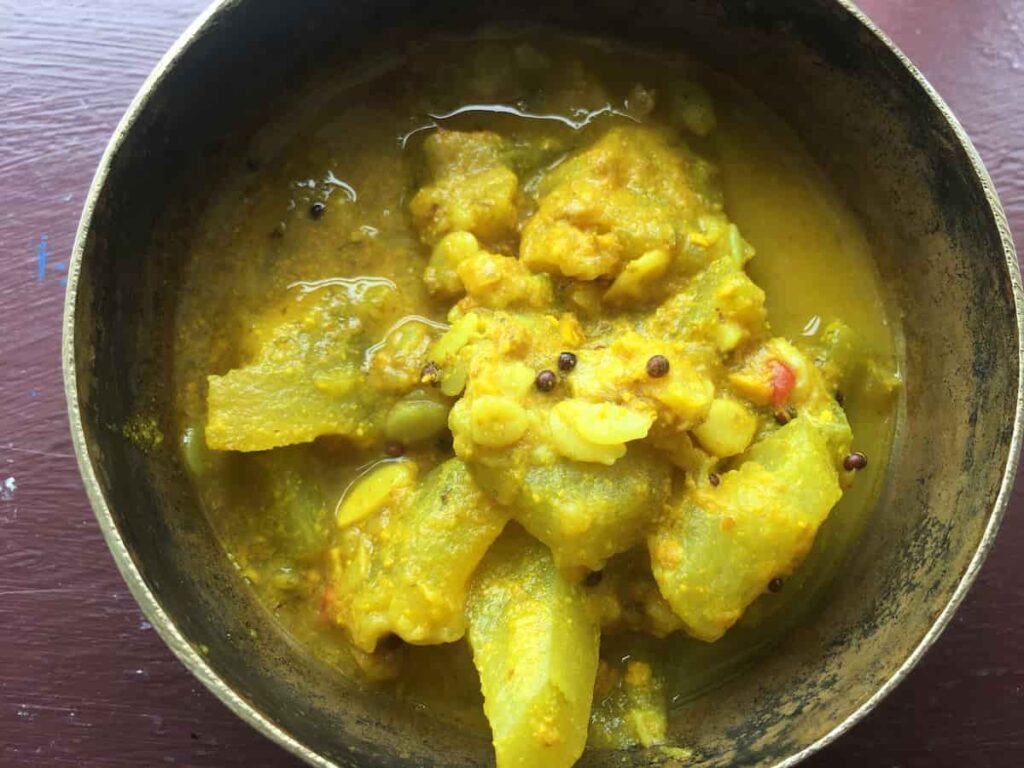
Winter Melon or Ash Gourd is a unique vegetable cum fruit. It holds a very special place in Ayurveda for it supports the digestive system, immunity, and mental acumen.
In this post we will look into the benefits, nutritional value, and interesting ways to consume winter melon. Let’s dive in!
Are Ash Gourd and Winter Melon same?
The technical name of winter melon is “Benincasa Hispida”. It belongs to the Cucurbitaceae family. The plant grows as an extensive trailing or climbing vine. It can grow on the hills up to 1200 m altitude.
Since, it grows very well in cold weather conditions, therefore it is often termed as winter melon. Some of the common names of winter melon are: petha, white gourd, white pumpkin, Neer Pooshnikkai, wax gourd, and ash gourd, Kumbalam, and Boodida Gummadi.
In this post we have used ash gourd and winter melon interchangeably.
Ayurveda: Winter Melon carries Maximum Prana – Life Force
Winter melon is considered a Sattvik food in Ayurveda. It promotes mental balance, fertility, ojas (a concept similar to qi or life force of an individual), and immunity.
Winter melon fruit contains plenty of seeds. This is a sign of fertility and happiness. Therefore, it is often termed as “Kushmanda” or pumpkin in the Ayurvedic texts.
Ayurvedic yogis consider winter melon to consist of maximum “Prana” – vitality or life giving force. It is highly energising and rejuvenating in nature. Therefore, people, who are struggling with weakness, illness, and debility should consume it more often in their meals.
Below, you will learn about the health benefits and gunas of ash gourd as described in Ayurvedic texts:
1. Effective for Inflammation, Pitta Imbalance, and Excessive Bleeding
Ash gourd has a cooling effect (veerya) on the body. It pacifies health disorders related to Pitta Imbalance and excessive heat such as inflammation and dryness.
Ayurveda suggests ash gourd juice and soup for health issues related to the inflammation of the digestive system such as hemorrhoids, ulcerative colitis, and irritable bowel syndrome.
Ash Gourd juice is one of the best remedies to handle Acidity and GERD related digestive issues.
Ash gourd is highly effective for excessive bleeding disorders such as heavy periods or Menorrhagia and nasal bleeding.
2. Winter Melon Nurtures and Heals the Body and Mind
Ash gourd has sweet Rasa and Vipaka (post-digestive effect on the body). Hence, it has a nurturing and healing effect on the body.
It helps to increase body strength, immunity, and supports weight gain. It kindles Agni – the digestive fire and supports overall health.
3. Supports Cognition, Memory, and Mental Balance
Ash gourd has a positive after effect on the mind. It promotes Medhya, the intellect and supports all 4 pillars of cognition. That is, ash gourd promotes alertness, memory, learning, and retention.
4. Consume Unripe Winter Melon in moderation
Unripe and immature winter melon fruits aggravate Kapha dosha. Hence, one should consume unripe ash gourd in moderation. This is even more relevant during high Kapha times such as winters, during night time, and for children suffering from cold and cough.
However, ripe melon is balancing for all three Doshas. It is not as cooling as the unripe fruit. Therefore, even Kapha dominant people can consume ripe winter melon to gain health benefits and weight loss.

5. Diuretic – Supports Urinary System Health
Kushmanda is diuretic in nature. It is rich in Potassium and Antioxidants. This helps to cleanse the bladder and prevent urinary disorders.
It is used in Ayurveda as an effective remedy for dysuria (pain during urination), urinary tract disorders, and urinary calculi.
Winter Melon Nutrition
Winter melon contains as much as 96% of water content. The fruits are rich in antioxidants, simple sugars, proteins, minerals, and vitamins.
It is a rich source of Folate, Vitamin C, Manganese, Phosphorus, Calcium, and Magnesium. It is also a good source of B Vitamins as Riboflavin, Thiamine, and Vitamin B3, and of minerals Zinc, Selenium, and Iron.
What is Winter Melon good for?
Winter melon is used many Asian traditional medicine systems to treat disorders of digestive system, inflammation, and cardiovascular system.
Ash gourd is consumed to prevent Diarrhea, Diabetes, Obesity, and toxin build up in the body.
The juice of the ash gourd is alkaline in nature. Therefore, raw winter melon is consumed for its energizing and anti-inflammatory properties.
Also, the cooked fruit calms the nervous system and supports digestive fire. It is usually added to curries, soups, and porridge in cooked form.
Let’s look into some of its health benefits from scientific perspective.
Health Benefits of Ash Gourd
1. Supports the Central nervous system (CNS)
Winter Melon promotes the health of Central nervous system. Animal studies show that alcoholic extract of winter melon fruit has an anti-compulsive effect through the enhancement of serotonin neurotransmitter in the brain.
It has an anti-depressant effect as it helps to relax and calm the nervous system.
2. Supports Digestive System and Prevents Stomach Ulcers
Studies indicate that the fruit extract of ash gourd has a strong anti-diarrheal effect. Also, the extract showed to have an anthelmintic effect against worms in the belly.
It has a protective function against ulcers due to its rich antioxidants profile. It protects the intestinal walls from free radicals.
Winter melon has high fiber and water content. It supports digestion, prevents constipation, and also helps to heal the hemorrhoids.
3. Prevents Asthma and supports Respiratory System health
In Ayurveda, kushmanda is prescribed for respiratory disorders. Scientific studies indicate that the extract of the fruit inhibits the release of histamine that leads to bronchiole spasms and hence asthmatic attacks.
Ayurveda suggest Kushmanda juice for patients suffering from Asthma and respiratory issues.
4. Antioxidants – Prevents Alzheimer’s
Extract of the fruit has an antioxidant effect which is beneficial in the treatment of Alzheimer disease. Kushmanda is used to treat mind and mental balance disorders in Ayurveda.
Studies indicate that winter melon antioxidants prevent free radical damage to the brain and also support the release of chemicals that protect the white matter.
5. Other Health Benefits
Studies showed the beneficial effect of the fruit extract in decreasing insulin, triglycerides, and glucose. Therefore, it is an excellent addition to the diet of Diabetics.
Ayurveda recommends ash gourd in high fever. This is because, it can lower down body temperature and also kindle the digestive fire.
Winter melon fruit extract is effective in the prevention of paracetamol (over the counter pain killers) induced toxicity of the kidneys. Hence, it works as a highly effective detox agent.
Winter Melon seeds – Health and Nutrition

Many researches have been conducted to show the nutritive and medicinal values of these seeds.
- The seeds contain significant amounts of healthy fatty acids. Some of these are palmitic acid, linoleic acid, oleic acid, and stearic acid.
- The seeds of ash gourd have a very high concentration of phenolic acids, even more than the extra virgin olive oil.
- Seeds of the fruit contain a high concentration of Vitamin E, an important antioxidant to prevent cardiovascular diseases and strokes.
The seeds are beneficial in the treatment of cardiovascular disorders and prevention of cancer as they contain high content of polyunsaturated and monounsaturated fatty acids.
Winter Melon Storage and Consumption
Immature fruits of winter melon are fairly hairy and dark green in color. However, the fruit loses hair when it matures.

Ripe and mature fruits of ash gourd are light greenish color. They have a wax like white coating on them. This coating is harmless for consumption. The waxy white coating also provides the fruit with an extended shelf life.
You can store a ripe ash gourd for as long as one month in dry and cold conditions.
How to Eat Winter Melon?
Ash gourd is a popular vegetable in South East Asia. It is widely consumed in many countries for both culinary and medicinal purposes. Here are some of the common ways of consuming ash gourd:
- Winter Melon soup is one of the popular dishes in Chinese cuisine. Here large chunks of the winter melon fruit are added to the soups and stews.
- You can use the pulp of the fruit to make desserts, jams, and cakes. Two of the very popular ash gourd desserts from India are petha and kashi halwa.
- It can also be stir-fried and parboiled along with herbs and spices. You can also cook it along with lentils.
- Similar to cucumber, it is also consumed raw in salads, pickled, and also added to snacks. You can also add raw winter melon to juices and smoothies.
- Ash gourd juice is a popular medicinal drink. It is made by juicing fresh pulp of the ripe fruit.
What does Winter Melon taste like?
The fruit of the winter melon plant is juicy, fleshy, and contains plenty of seeds inside. Similar to other gourds, it doesn’t carry a specific taste, yet blends well with the other ingredients.
Ash gourd juice is highly refreshing. It tastes and feels similar to that of cucumber or bottle gourd juice. You can add lemon, salt, black pepper, or honey for some flavor.
Cooked fruit carries a jelly like texture in soups and curries. It feels similar to water melon rind.
Can you eat raw winter melon?
Winter melon in raw form carries much life force and nutrients than the cooked form. Therefore, Ayurveda suggests that one should consume raw fruit for medicinal purposes.
You can either juice it or eat it as a salad when you want to consume it in raw form.
Recipe: Winter Melon curry with peanuts

This recipe is super delicious, simple, and a quick one. You can have it with chapati (Indian bread), rice, or any grain of your choice. This winter melon recipe is great for children and for adults who are looking for healthy meal options.
Winter melon curry cooked in Indian style with peanuts
Equipment
- Pressure Cooker (Optional)
- Mortar and Pestle or Grinder
Ingredients
- 400 g Fresh ripe winter melon
- 2 tbsp Raw peanut kernels
- 1½ tsp Rock Salt to taste
- 1 pinch Asafetida or Hing
- ½ inch Fresh ginger root
- 1½ tsp Mustard Seeds
- 1½ tsp Turmeric Powder
- 1½ tsp Coriander Seeds Powder
- 1½ tbsp Pure cooking oil ghee or mustard oil
- 2-3 sprigs Fresh coriander leaves or cilantro leaves
- 2-3 sprigs Fresh curry leaves
- 1 small Tomato finely chopped
Instructions
Prepare Peanut paste
- Add peanuts and ginger root to the grinder with 1 tbsp water and grind it to get smooth paste.
Prepare Winter Melon
- Wash and Peel the melon.
- Cut the melon into 1/2 inch small pieces and keep aside.
Prepare the curry
- Heat the pan or pressure cooker.
- Add ghee once the pan is hot. Add Asafetida powder and mustard seeds.
- Let the seeds crackle. Now add the curry leaves and peanut paste.
- Mix well and let the paste be roasted properly.
- Now add salt, turmeric, and coriander seeds powder. Mix well.
- Now add the chopped tomato and mix well. Let the tomato be slightly mashed.
- Now add the cut melon pieces. Add about 50 ml of water if you are cooking in a pan. Add 2 tbsp water if you are cooking in a pressure cooker.
- Cover and let the melon be cooked till it turns soft. Close the heat.
- Garnish with chopped coriander leaves. Serve with chapati or rice. Enjoy!

We would love to hear from you! If you try this recipe, do leave a comment and rate the recipe! Don’t forget to take a photo, tag @medhyaherbals, and hashtag it #medhyaherbals on Instagram. Eat Well, Feel Happy, and Look Awesome!
References
Research Article on Ayurvedic review and pharmacognostical properties of Ash Gourd
Nutritional composition and oil fatty acids of Indian winter melon Benincasa hispida (Thunb.) seeds

